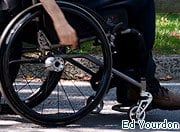The majority of patients who are almost completely paralysed but fully conscious have said they are happy and do not want to die, according to a major survey.
It will undermine calls by pro-euthanasia groups to change the laws so that such people can be ‘put out of their misery’.
The survey looked at people who have what is known as ‘locked-in syndrome’. It revealed that the longer sufferers have the condition, the more likely they are to report happiness.
Survey
The survey, which was published online last month by the British Medical Journal Open, questioned 168 members of the French Association for Locked-in Syndrome.
The survey contained a range of questions including such things as satisfaction with personal relationships, anxiety, pain and social activities.
Of the 65 people whose responses formed the basis of the survey, 47 – almost three quarters – said they were happy.
And only four said they wished for euthanasia, while most had never had thoughts of suicide.
Conclusions
The conclusions of the survey stressed “the need for extra palliative efforts” and the importance of therapy to reduce anxiety.
The authors also recommended that those who were considering euthanasia “should be assured that there is a high chance they will regain a happy meaningful life.”
Case study
Michelle Wheatley was bathing her younger child, Holly, when she was struck down by a massive stroke in 2008. She suffered a rare brain stem stroke and when she came out of her coma doctors found she had locked-in syndrome.
The former dental nurse, 27, was left almost totally paralysed and, while she could see, hear and think normally, she could only communicate by moving her eyes up and down.
But the mother-of-two is absolutely determined to live as full a life as possible with her family. Through moving her eyes she has developed a way of ‘speaking’, which allows her to communicate.
Determined
She is even able to ‘talk’ to her young children, Ryan and Holly, and tell them off when they are being naughty.
She says that while her condition is tough to cope with she is determined to try everything to make progress.
Her father, Frank, said: ‘Michelle is an incredibly positive person and we are immensely proud of the way she approaches her condition.’
Challenged
The assumption that locked-in syndrome sufferers can never recover has also been recently challenged.
Graham Miles, who felt he had been “left to die” by medical staff, was suffering from the condition after having a massive stroke.
Last summer, however, he amazed doctors by recovering from the illness, which had left him completely paralysed from head to toe.
The resilient 66-year-old is now able to walk and talk and has even taken up motor racing as a hobby.
Paralysed
In August 2010, a mother of two revealed how she never lost her will to live after an illness left her paralysed and unable to speak for 18 months.
Kerry Pink was left suffering from locked-in syndrome by an undiagnosed neurological illness when she was just 35.
Writing in the Daily Mail, she said: “My memories are blurred. But some things remain absolutely certain. I know that however dark the twilight world I inhabited, I never lost my will to live.”
She spoke of the terrifying moment she heard her doctors advising her husband that she wouldn’t make it through.
Anger
“I remember a flash of abject terror, then anger”, she said. “I clearly recall thinking: ‘How dare they say I’m not going to pull through.'”
Mrs Pink is now able to walk a few steps and has recovered all of her speech.
And, with the help of her family or a carer, she is able to socialise and visit shops and restaurants.

